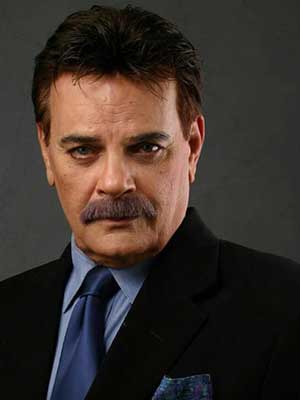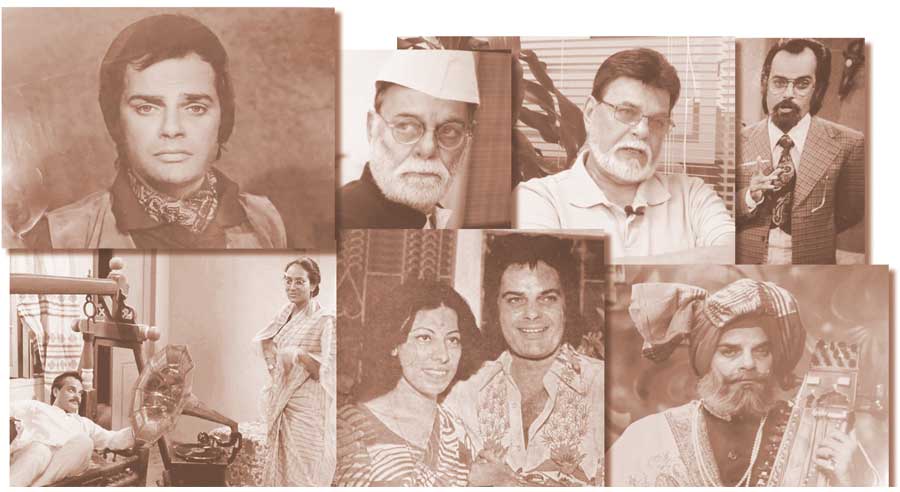THREADS OF SUCCESS
- 06 Apr - 12 Apr, 2024

I was born in Bhopal. My mother was from there and father from Lucknow. I was the first male child in my naniyal. As the saying goes, I was the blue-eyed boy,” Shakeel opens our conversation by letting me in on his childhood. He adds, “My parents hired a governess for me, an English lady. Naturally, I had a lot of nakhras, too. I was a fastidious child when it came to eating. Songs would be sung for me at dinnertime and everyone would try to entertain me while I ate.” A four-year-old Shakeel was admitted into one of the first convents by French missionary, called La Martiniere Lucknow, where he studied for about two-and-a-half years before migrating to Karachi, Pakistan. As a young boy, Shakeel recalls going to the church while at the convent and singing hymns. “You’d be surprised to know that though I was from a Muslim family, at the convent, as part of the practice, we all had to go to the church, because it was being run by nuns, it didn’t matter what other religion you belonged to, you had to go pray,” he continues further about his life at La Martiniere, “They were very strict there; I was allowed to go home only once or twice a month. Even when I had chicken pox, I wasn’t allowed to go home. There was a small hospital on the premises, I was instructed to remain there. My parents would visit and bring me things, of course.” He gives this initial time a lot of credit for the discipline he acquired during his childhood. Once in the City of Lights, young Shakeel completed his education all the way through graduation.
“I would rarely take part in a tableau or a function in my student life. I didn’t have the faintest idea that I would become an actor,” reveals the veteran artiste who has ample of expertise today in different mediums, having done radio, television, theatre and films. Shakeel got his first taste of the field work at Radio Pakistan when he was still in school. It was his Urdu teacher, who was also a prominent journalist and a writer, who introduced him to this part of the world. “A very interesting thing that happened was that Radio Pakistan had introduced a school broadcast programme in which students would dramatise and perform everything that they learnt in their classes. Every school would have a small radio set up in the classroom where the class would listen to this broadcast. That made it easy for students to understand things. I was one of the lucky ones to be picked to record for the radio.” Shakeel dips into his memories of that time and shares a funny story. “I was there (at the recording), the room was chilled and it was a live broadcast. I started sneezing; my nose started running and I wasn’t even carrying a handkerchief at the time.” Of course, he was helped immediately by one of the teachers present there. He did a few more radio shows in English but couldn’t keep up with it.
Apparently, Shakeel’s fate had already been sealed, for opportunities followed him wherever he went. During his time in college he bumped into famous drama writer late Ali Ahmed who introduced him to the inspiring world of theatre. “I used to catch a bus from Nazimabad and come all the way to Arts Council. I made my stage debut with an adaptation of the play Hay Fever, and then we did a lot of serious plays.” He doesn’t shy away from giving theatre all the credit for making an actor. “Ek theatre trained actor kaheen maar nahi khaa sakta. Whatever I know today, it is because my training in theatre; throw of voice, body language, foot work, use of facial muscles. These are very important things, and they helped me tremendously later on in my career.”

Before Shakeel became the rising star through his work on television, he was Shakeel, the movie star, for however a brief period. It was the eyes of S.M Yusuf, the famous movie director who migrated from India after giving hits there, that spotted the young and handsome man. Shakeel shares that working in movies was looked down upon at that time, yet he never faced any sort of discouragement from his family regarding the career choice. But since he had never thought of becoming a film actor, he politely refused the offer the first time. “But when I was approached again, things had changed slightly in that I had finished my education and was working with an advertising agency at an executive post. Theatre wasn’t doing all that great, so I thought if someone has to make a name for themselves in showbiz, movies seem to be the way to go,” he states that he agreed to sign on the project on the condition that he doesn’t leave his job (for the fear that he might not make it in movies), and hence, ended up shooting for his debut movie Honhaar (1966) mostly during the night. The story of two brothers brought together Shakeel as the younger, spoilt one and Waheed Murad as the older one.
“I had come straight from my office to attend the premiere. By the time the movie ended, there was such a huge crowd that had gathered for me that I had to hide inside the manager’s office there for a while then go back in a cab. I didn’t even have enough cash for it and had to ask my boss to pay the driver when I reached back to the office,” Shakeel shares a funny memory, stating that the movie might not have done well, but his performance was greatly appreciated. After his second movie Suhagan, again with S.M Yusuf, he had started receiving a lot of movie offers. “With no one to guide me at the time, I signed them (movies) right and left. Not a lot of movies worked out well which forced me to come towards television, and I joined PTV which I call my home, it made me into who I am today,” he remembers how an unfortunate time turned into a golden opportunity that changed his life.
“Initially in my career, I had gotten a lot of romantic roles that had earned me the label of a chocolate hero. I was fed up of that and wanted to do serious work. It was at that point that I was offered the titular role of Uncle Urfi that became a turning point in my career. Funnily enough, even that role was offered to be because it had a bit of a romantic side to it,” admits Shakeel, adding, “The serial was such a roaring success that events were held keeping in mind its airing dates. People would even keep television sets at weddings, so as to not miss the show.” After the hugely successful Uncle Urfi (1975), the actor then went on to play Mehboob Ahmad in cult classic Aangan Terha, a satirical Pakistani drama penned by Anwar Maqsood, alongside legends like Salim Nasir, Arshad Mehmood, Bushra Ansari and Durdana Butt.
Interestingly, Shakeel had been asked to read for Akbar’s part, eventually played by Salim Nasir, on director Faisal Farooq’s insistence. However, both, the writer and Shakeel were more comfortable with him playing the role of Ahmad. After reading for two days, the actors switched their characters, and the rest, they say, is history.
I ask what has made him ‘Shakeel’, the phenomenon that he has become. “My name was changed from Yousuf Kamal; S.M Yusuf sahib had a son Iqbal Yusuf and we had a couple of more Yousufs in the field, so it was thought best to think of an alternate name for me to be used on screen, for it would have been hard for me as a newcomer to make my own name in their presence. Before we could decide something, a local newspaper printed a huge ad with my face, saying ‘Introducing Shakeel’. Everyone ended up concurring on the name, even though I didn’t like it,” the Gemini, who is extremely passionate about dress designing and home décor, puts a humourous spin on the answer.
COMMENTS